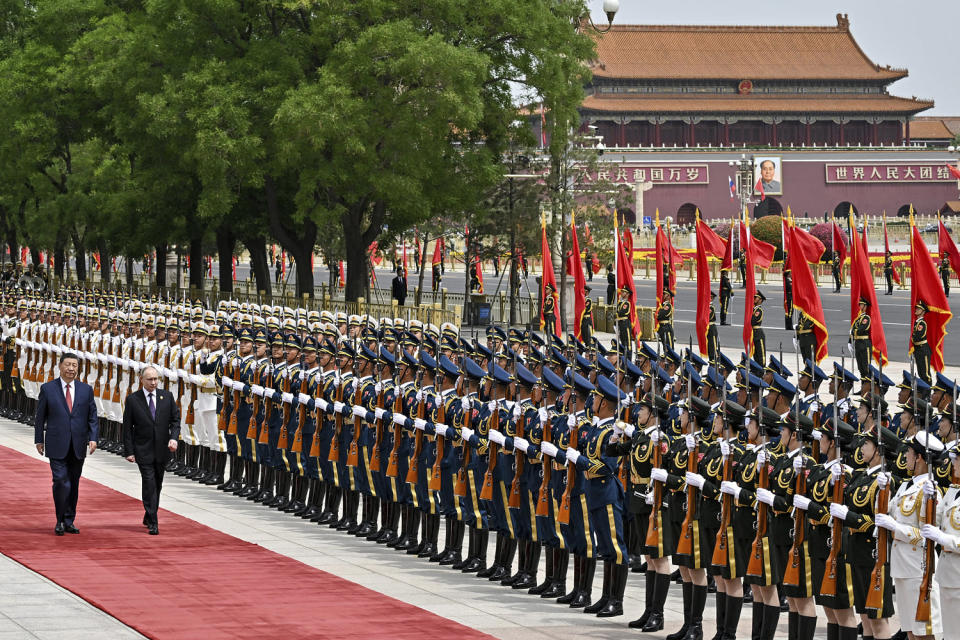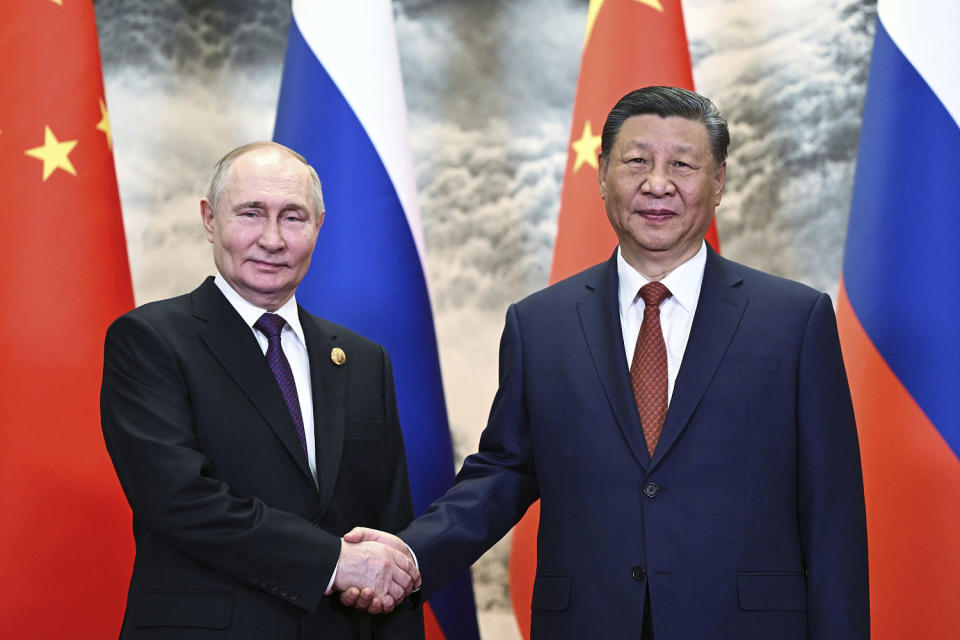Putin and Xi vow to deepen 'no limits' partnership as Russia advances in Ukraine
- Oops!Something went wrong.Please try again later.
- Oops!Something went wrong.Please try again later.
HONG KONG — They’ve already declared it has “no limits,” and on Thursday Russian President Vladimir Putin and Chinese President Xi Jinping vowed to deepen a partnership increasingly characterized by their countries’ clash with the West.
The two autocratic leaders met in Beijing in a show of unity between the two U.S. rivals as Putin wages a new offensive in his war on Ukraine.
Putin’s two-day state visit to China is his first overseas trip since he began a fifth term in office with a shake-up of his military leadership. It comes as Russia has seized the initiative in the war, now in its third year, and as the United States intensifies pressure on China to do more to stop it.
In February 2022, days before Putin invaded Ukraine, he and Xi declared a “no limits” partnership, and the two longtime leaders are personal friends. On Thursday, they signed a joint statement deepening the comprehensive strategic partnership between their two countries.
That is not the same as a formal alliance, but the possibility that China and Russia could one day form one serves as a kind of “strategic ambiguity” that can constrain the U.S. and others, said Natasha Kuhrt, a senior lecturer in international peace and security at King’s College London.
“They can keep us guessing about whether they will or won’t escalate, whether they will or won’t strengthen the partnership and the direction of an alliance and that in itself is a kind of deterrent,” she told NBC News.
Relations between China and Russia, which are celebrating 75 years of diplomatic relations during Putin’s visit, have been strongly tested by the war in Ukraine and Putin’s growing international isolation amid Western opposition to it.
Though China has strived to portray itself as neutral in the conflict, it has provided Russia with diplomatic support as well as advanced technology with both civilian and military uses. It is also an increasingly important economic partner for Russia, becoming one of the top markets for its Western-sanctioned oil and gas.
China has also put forward a vague, 12-point peace plan that would allow Russia to retain its territorial gains in Ukraine and has been dismissed by the West.
On Thursday, Putin said he was “grateful” for China’s initiatives to resolve the war in Ukraine, while Xi said China “hopes for the early return of Europe to peace and stability and will continue to play a constructive role toward this.”
Though still willing to show support for his “dear friend” Putin, Xi also has to consider what it might cost him in his relations with the U.S. and Europe.

The U.S., which last month approved $60 billion in military aid for Ukraine that is just starting to arrive, has imposed a series of sanctions on Chinese companies accused of aiding the Russian war effort, and is also threatening to sanction Chinese banks.During a visit to Beijing last month, Secretary of State Antony Blinken said “Russia would struggle to sustain its assault on Ukraine without China’s support,” and that he had told Chinese officials that “if China does not address this problem, we will.”
Xi, who is seeking to retain or expand overseas markets amid an economic slowdown at home, is also reluctant to alienate leaders in Europe. Last week, during his first visit to the continent in five years, Xi was pressured by French President Emmanuel Macron and European Commission President Ursula von der Leyen to use his influence over Putin to end the war in Ukraine.
Xi rejected their criticism of his country’s relationship with Russia, and said China was not a participant in the war. But the pressure may be having an effect: After a record $240 billion in overall trade between China and Russia last year, Chinese exports to Russia fell in March for the first time since 2022.
Both Xi and Putin have also moved away from the term “no limits” when it comes to talking about their ties.
“Xi basically doesn’t really talk about it in those terms anymore. He talks about a good neighborly relationship, comprehensive strategic coordination and mutually beneficial cooperation,” Kuhrt said. “And Russia talks about flexible strategic partnerships.”
Victor Gao, vice president of the Beijing-based Center for China and Globalization, said China did not have to choose between Russia and the West.
“I think China should make continuous efforts to improve the relationship between China and the West. In fact, this is not contradictory to improving relations between China and Russia,” said Gao, who is also chair professor at Soochow University.

Putin arrived in the Chinese capital early Thursday and was greeted with full military honors outside the Great Hall of the People next to Tiananmen Square, where he shook hands with Xi before heading inside for talks.In addition to Beijing, Putin is expected to visit the northeastern city of Harbin, near the two countries’ 2,600-mile border, which is holding a China-Russia trade fair this week.
In an interview Wednesday with Xinhua, China’s state-run news agency, Putin cited the “unprecedented level of strategic partnership between our countries” as his reason for making China the first stop of his fifth term.
Among those traveling with Putin is Andrei Belousov, an economist who was named the Russian defense minister this week in a surprise shake-up. His predecessor, Sergei Shoigu, is also on the trip.
Russia’s new offensive in northern Ukraine has made early gains, worrying Kyiv and its allies that Putin’s military may be able to make decisive progress in the coming weeks.
Xi, 70, and Putin, 71, have met more than 40 times, either in person or virtually. Putin was last in Beijing in October, while Xi was in Moscow days after he secured an unprecedented third term as Chinese president in March 2023.
This article was originally published on NBCNews.com

